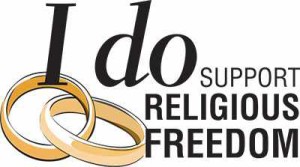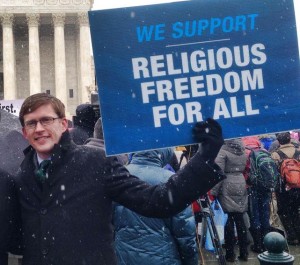 A funny thing happened when those who find marriage equality so upsetting started loudly complaining about alleged violations of their religious freedom: People whose religious freedom actually is being violated stepped forward.
A funny thing happened when those who find marriage equality so upsetting started loudly complaining about alleged violations of their religious freedom: People whose religious freedom actually is being violated stepped forward.
As reported here last month, the first ever Witness for Love held in Loudoun County drew a number of local clergy, who testified to being barred from performing the rites of marriage for same gender couples in accordance with their faith. Many people don’t realize that Virginia law includes a provision that makes it unlawful for an officiant to perform a marriage ceremony unless the couple has a legal marriage license. This provision does exactly what it sounds like it would do: It erases the supposed distinction between ‘civil’ and ‘religious’ marriage by restricting religious marriage celebration to what is permitted by civil law.
While no clergy or denomination ever has, nor ever will, be required to perform the rites of a same-gender marriage, an interracial marriage, an interfaith marriage, a marriage involving a divorced person, or any other marriage that fails to meet their particular religious criteria, those clergy and denominations that actively seek to celebrate the marriages of same gender couples in their communities are instead required to treat those couples as if they are unworthy of such celebration. That requirement (unlike the make-believe scenarios of anti-gay activists) is a very real and grievous violation of religious conscience. It unmistakably, to use the current language of the anti-gay crowd, “violates their sincerely held religious belief” in the equal dignity and humanity of their LGBT parishioners. Today, one of those denominations finally filed a lawsuit seeking the restoration of First Amendment rights to its clergy.
In what is believed to the first-ever challenge by a national Christian denomination of a state’s marriage laws, the UCC filed the lawsuit Monday morning, April 28, in U.S. District Court in Charlotte, N.C.
Under Amendment One, which passed in late 2012, it is a crime in the State of North Carolina for clergy to officiate a marriage ceremony without determining whether the couple involved has a valid marriage license. United Church of Christ ministers interested in conducting a religious marriage ceremony for same-gender couples could face up to 120 days of jail and/or probation and community service if found guilty, since North Carolina marriage laws define and regulate marriage as being between only a man and a woman. As lead plaintiff in this lawsuit against the State, the United Church of Christ asserts that these laws are unconstitutional and violate clergy’s First Amendment rights.

“Manhattan Declaration” director Eric Teetsel, bearing false witness before the Supreme Court last month
These activists wanted to make religious liberty a burning issue. Good. Let’s have that conversation. Let’s examine, objectively, who actually has a valid religious liberty claim. The United Church of Christ lawsuit leaves no doubt, and leaves hypocrites like poor Mr. Teetsel holding their transparently dishonest signs.

Terry and Sandy make much more sympathetic plaintiffs than all the porn producers, don’t they? I agree, this sort of thing is disturbing. However, it matters a great deal that it isn’t about religious freedom, specifically the freedom of clergy to say anything in a sermon short of “go out there right now and stone them there homosexual offenders to death.” That freedom is protected by the U.S. Constitution and there isn’t a single shred of evidence that it is threatened. The freedom of the Lutheran, UCC, Baptist, Jewish and other clergy who have filed suit in NC to practice their faith unhindered by the state, however, is being violated right now – and you have not said a thing about that actual, concrete, demonstrable violation, that has zippity to do with the IRS. So, do you or do you not uphold the religious liberty of these clergy, even though you disagree with their theological views?
Here is an article from George Will today. While it isn’t religious freedom, it does show how the IRS has become the hit-man of choice for the federal government.
http://www.washingtonpost.com/opinions/george-f-will-the-heavy-hand-of-the-irs/2014/04/30/7a56ca9e-cfc5-11e3-a6b1-45c4dffb85a6_story.html?tid=pm_pop
It is examples such as this that make it easy from me to believe the above scenario is not just plausible, but quite possible.
That’s not a realistic fear. Clergy engage in hate speech all the time. The only restriction imposed on clergy with regard to tax status is the prohibition on directly endorsing candidates for public office. If anything, clergy who object even to that minor restriction are getting away with flouting IRS rules.
I’ll check to see if you have comments in moderation.
I’m not saying it does currently happen (although my first couple examples are real). I’m saying it is not unreasonable to look at the way the IRS is being abused, or the tax code in general, and then foresee a future where liberals slap “hate speech” onto sermons and say that they are “politically motived” and send threatening letters via the IRS to churches insinuating the removal of their tax exempt status if they don’t shut up.
PS I can’t post to the other thread on Love at the County Courthouse. I’ve tried a dozen times and it doesn’t work
David, can you provide any examples of churches losing their tax-exempt status for refusing to marry divorced people or interfaith couples? I mean actual examples in the U.S., not made up ones involving property that was held out as a public accommodation, or an incident that happened in a foreign country that is not subject to our First Amendment.
Bonus question: Can you explain how the current situation that prompted this lawsuit does NOT violate the religious liberty of these clergy who wish to celebrate religious marriages of same sex couples? Do you not think that they are entitled to religious liberty, even though you don’t share their theological views?
Liz, my point is that I can foresee coercion under the pretext of having religious liberty.
You don’t have to have taxes taken out of your paycheck, but if you are off more than 10% of what you owe at the end of the year you get a tax penalty.
You don’t have to have health insurance, but you will have to pay an additional tax at the end of they year if you don’t.
You don’t have to marry same sex couples but if you don’t your organization will lose its tax-exempt status.
Is that really so hard to envision? The tax code is being used to curb our freedoms. I don’t see that abuse stopping any time soon.
Mr. Dickinson, Catholic priests are not forced to marry divorced people, or to marry Protestant people, or to marry Jewish people, or to marry Protestants to Catholics or Jews to Catholics. Nor are rabbis, or pastors, or imams forced to marry people who don’t conform to their faiths.
Divorce has been legal in this country for quite a while now, and remarriages are common, but not one church, not one synagogue, not one temple or mosque has been forced by our governments to allow a marriage of divorced people to take place.
Why would you think any other marriage would be different, when there are so many more divorced people wanting to re-marry than LGBT folks wanting to marry in the first place?
“While no clergy or denomination ever has, nor ever will, be required to perform the rites of a same-gender marriage….”
Really? You don’t envision a future where, if clergy refuse, that their tax exempt status will be pulled? I think that is easy to see. It won’t be illegal, you will just have to pay a penalty and, therefore, you are “free” to do what you want as long as you accept the consequences.